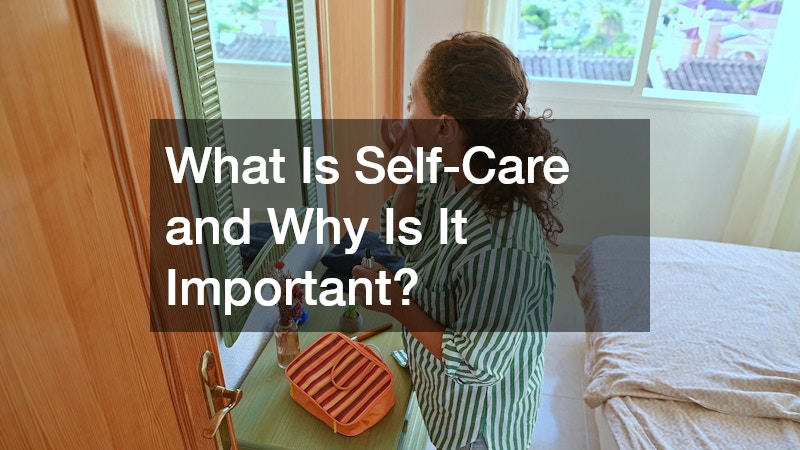Self Care Lesson Plans That Inspire Healthy Habits


In today’s fast-paced world, prioritizing self-care is more important than ever. Self-care encompasses a range of practices that individuals can engage in to maintain and enhance their health and well-being. Implementing effective self-care lesson plans can serve as a valuable tool in promoting healthy habits across various age groups. These lesson plans are designed to educate individuals about the importance of self-care and provide them with practical strategies to incorporate into their daily lives. By fostering an understanding of self-care, these plans aim to empower individuals to take proactive steps towards achieving and maintaining optimal health.
What Is Self-Care and Why Is It Important?

Defining Self-Care
Self-care refers to the intentional actions individuals take to preserve or improve their health, manage stress, and enhance their overall quality of life. It involves activities that promote physical, mental, and emotional well-being. Engaging in regular self-care practices can lead to improved mood, better physical health, and increased resilience against stress.
The Role of Self-Care in Overall Health
Incorporating self-care into daily routines contributes significantly to maintaining a balanced and healthy lifestyle. Physical activities such as regular exercise, proper nutrition, and adequate sleep are fundamental aspects of self-care that support bodily health. Mental and emotional self-care practices, including mindfulness, relaxation techniques, and seeking social support, are equally crucial for sustaining mental health and emotional stability.
Common Misconceptions About Self-Care
Despite its benefits, several misconceptions about self-care persist. Some individuals may perceive self-care as indulgent or unnecessary, while others might equate it solely with pampering activities like spa visits. However, true self-care encompasses a holistic approach that includes maintaining physical health, managing stress, and nurturing emotional well-being. Educating individuals about these misconceptions is essential to encourage the adoption of comprehensive self-care practices.
How Can I Create a Self-Care Routine?
Assessing Personal Needs
The first step in creating an effective self-care routine is to assess individual needs. This involves reflecting on aspects of life that may require attention or improvement, such as physical health, stress levels, emotional well-being, and social connections. Identifying areas that need support allows individuals to tailor their self-care practices to address specific concerns.
Setting Realistic Goals
Establishing achievable goals is crucial in developing a sustainable self-care routine. Goals should be specific, measurable, attainable, relevant, and time-bound (SMART). For instance, setting a goal to engage in 30 minutes of physical activity three times a week is a realistic and measurable objective that contributes to physical health.
Incorporating Self-Care Into Daily Life
Integrating self-care practices into daily routines ensures consistency and effectiveness. This can include scheduling regular exercise sessions, preparing balanced meals, practicing relaxation techniques, and dedicating time for social interactions. Consistency in these practices reinforces their benefits and promotes long-term well-being.
Effective Self-Care Activities
Physical Self-Care Practices
Engaging in physical activities is a fundamental aspect of self-care. Regular exercise, such as walking, swimming, or participating in a local tennis program, enhances cardiovascular health, boosts mood, and increases energy levels. Additionally, wearing appropriate athletic footwear and utilizing quality athletic flooring during workouts can prevent injuries and improve performance.
Mental and Emotional Self-Care Techniques
Mental and emotional well-being are integral components of self-care. Practices like mindfulness meditation, journaling, and seeking professional support from digestive health specialists can help manage stress and promote emotional balance. Engaging in creative activities, such as art or music, also provides outlets for emotional expression and relaxation.
Creative and Social Self-Care Options
Participating in creative and social activities fosters a sense of community and personal fulfillment. Attending swimming classes, joining group fitness sessions, or engaging in social clubs can enhance social connections and provide opportunities for enjoyable experiences. These activities contribute to a well-rounded self-care routine that addresses various aspects of well-being.
Motivating Others to Practice Self-Care

Setting an Example Through Personal Practice
Demonstrating commitment to self-care can inspire others to adopt similar practices. By prioritizing personal health and well-being, individuals set a positive example that encourages those around them to value and engage in self-care activities. Modeling self-care consistently, even during busy or stressful times, reinforces the importance of these habits.
Showing vulnerability by acknowledging challenges and sharing strategies for overcoming them can further motivate others, making self-care feel achievable rather than daunting. Whether it’s taking a midday walk, attending a local tennis program, or scheduling a few minutes for mindfulness, visible commitment highlights that self-care is a practical and integral part of daily life, not a luxury or optional extra.
Creating Supportive Environments
Establishing environments that promote self-care is essential. This can involve creating spaces conducive to relaxation, providing resources for physical activities, and fostering a culture that values health and well-being. Supportive environments can also include access to community resources, such as swimming classes, wellness workshops, or partnerships with food service solutions for healthy meal options.
Encouraging flexible schedules, quiet areas, or group exercise sessions allows individuals to participate without feeling pressured or judged. By reducing barriers and making resources easily accessible, these environments not only facilitate the adoption of self-care routines but also strengthen a sense of belonging and collective accountability among peers. Positive reinforcement and recognition of small milestones can further enhance engagement.
Encouraging Open Conversations About Self-Care
Facilitating discussions about self-care helps normalize the practice and reduces stigma. Open conversations allow individuals to share experiences, challenges, and strategies, fostering a supportive community focused on collective well-being. Encouraging dialogue in group settings, whether in classrooms, workplaces, or social circles, can demystify self-care by highlighting diverse approaches and individual needs.
Offering guided conversations, workshops, or peer support groups ensures that people feel safe and heard when discussing personal habits or struggles. Sharing success stories, tips, and professional insights—such as advice from digestive health specialists or fitness experts—creates an inclusive environment that reinforces the value of self-care as an ongoing, communal practice rather than a solitary effort.
The Role of Mindfulness in Self-Care
Understanding Mindfulness
Mindfulness involves paying focused attention to the present moment without judgment. Incorporating mindfulness into self-care routines enhances awareness and promotes a calm, centered state of mind.
Mindfulness Practices to Include in Self-Care
Activities such as deep breathing exercises, guided meditation, and mindful walking are effective mindfulness practices. These techniques can be integrated into daily routines to reduce stress and enhance emotional regulation.
Benefits of Mindfulness for Mental Health
Regular mindfulness practice has been shown to reduce symptoms of anxiety and depression, improve focus and concentration, and enhance overall emotional well-being. By incorporating mindfulness into self-care plans, individuals can experience these mental health benefits.
Technology and Self-Care
Using Apps for Self-Care Tracking
Numerous applications are available to assist individuals in tracking their self-care activities. These apps can monitor physical activity, sleep patterns, nutrition, and mood, providing insights into personal habits and progress. Many apps also offer reminders and personalized suggestions based on tracked data, helping users stay consistent with their routines.
Some platforms integrate with wearable devices, allowing for seamless monitoring of heart rate, steps, and sleep quality. By offering visual progress reports and goal-setting features, these apps transform abstract self-care objectives into tangible, trackable milestones, motivating individuals to maintain and improve their habits over time.
Something else to consider is a weight-tracking app. If your goal is to lose weight, but you’re not seeing results despite all of your hard work, look into medical weight loss treatment. Sometimes stubborn weight is an indicator of an underlying health issue.
Virtual Support Networks
Online communities and forums offer platforms for individuals to connect, share experiences, and receive support. Engaging with virtual support networks can enhance motivation and provide encouragement in maintaining self-care routines. These communities can also introduce participants to new strategies, resources, and professional guidance, such as advice from digestive health specialists or wellness coaches.
Being part of a network helps normalize the challenges of self-care, providing reassurance that struggles are shared and solutions exist. Active participation fosters accountability, creates a sense of belonging, and encourages ongoing engagement with self-care activities, from structured exercise to mindfulness practices.
Mindfulness and Wellness Technology
Technological tools, such as wearable devices and guided meditation platforms, can facilitate mindfulness practices and promote overall wellness. These technologies offer convenient ways to incorporate self-care into daily life. Devices can provide reminders to pause, stretch, or practice deep breathing, integrating wellness into otherwise busy schedules.
Advanced platforms even offer interactive meditation sessions, virtual yoga classes, or real-time feedback on breathing and posture, enhancing the effectiveness of self-care efforts. By blending accessibility, personalization, and accountability, these tools make it easier for individuals to sustain healthy habits consistently, ensuring that mindfulness and overall well-being remain a practical and achievable part of daily routines.
Challenges in Maintaining a Self-Care Routine

Common Obstacles to Self-Care
Barriers to consistent self-care include time constraints, lack of motivation, and competing priorities. Identifying these obstacles allows individuals to develop strategies to overcome them.
Strategies for Overcoming Self-Care Challenges
Implementing time management techniques, setting realistic goals, and seeking accountability can help individuals maintain their self-care routines. Additionally, being flexible and adjusting plans as needed ensures sustainability.
The Importance of Flexibility in Self-Care
Recognizing that self-care needs may change over time is crucial. Adapting self-care practices to align with current circumstances and personal needs ensures continued effectiveness and relevance.
Self-Care and Productivity
Relationship Between Self-Care and Focus
Engaging in regular self-care activities enhances cognitive function and concentration. By reducing stress and promoting mental clarity, individuals can improve their ability to focus on tasks and responsibilities.
Impact of Self-Care on Stress Levels
Consistent self-care practices help manage and reduce stress levels. Activities such as physical exercise, relaxation techniques, and social engagement contribute to lower stress and increased resilience.
Long-Term Productivity Benefits of Self-Care
Maintaining a balanced self-care routine leads to sustained energy levels, improved mood, and greater overall well-being. These benefits translate into enhanced productivity and performance in various areas of life.
Resources for Implementing Self-Care Lesson Plans
Books and Guides on Self-Care
Numerous resources provide valuable information on self-care practices. Books and guides offer insights into developing personalized self-care plans and strategies for maintaining well-being.
Workshops and Courses on Self-Care
Participating in workshops and courses can provide structured learning experiences focused on self-care. These programs often include practical exercises and expert guidance to support individuals in their self-care journeys.
Community Resources and Support Groups
Local organizations and support groups offer resources and opportunities for individuals to engage in self-care activities. These community-based options provide social support and access to various self-care programs. For instance, collaborations with digestive health specialists or local fitness programs like swimming classes and tennis programs can provide hands-on learning experiences. Similarly, access to services like alterations ensures all participants can comfortably engage in physical activities, and aesthetic resources like sculptra workshops may enhance confidence and self-esteem.
Integrating Self-Care Into Daily Life

Practical Applications for Everyday Wellness
Encouraging activities like meal planning with healthy food service solutions, setting aside time for physical exercise, or scheduling mindfulness breaks can make self-care habitual rather than occasional. Regular review and adaptation of routines allow for flexibility, ensuring that individuals continue to meet their changing needs. Tools such as athletic flooring for safe exercise, adult swim lessons, or participation in a local tennis program provide structured avenues for physical self-care while fostering engagement and consistency.
Incorporating Physical Activity Into Routine
Consistent engagement in physical activity, whether through swimming classes, local tennis programs, or home workouts, strengthens both physical and mental well-being. Using quality athletic footwear and safe athletic flooring enhances performance and reduces the risk of injury, making exercise a sustainable component of daily life.
Mindful Planning and Nutrition Strategies
Meal planning and thoughtful nutrition choices, supported by local food service solutions, play a crucial role in maintaining energy and focus throughout the day. Allocating time for mindfulness breaks, reflection, or guided meditation sessions reinforces emotional resilience and promotes a balanced approach to wellness.
Conclusion
Developing and implementing self-care lesson plans is a crucial step in nurturing long-term healthy habits. By addressing physical, mental, and social aspects of wellness, these plans equip individuals with the tools they need to thrive. From practical strategies like meal planning and engaging in physical activity to leveraging resources such as digestive health specialists, food service solutions, athletic footwear, and athletic flooring, comprehensive self-care approaches promote holistic well-being. Incorporating creative and social elements, along with modern technology for mindfulness and tracking, ensures a balanced and adaptable routine. Ultimately, self-care lesson plans empower individuals of all ages to take proactive steps toward sustained health, resilience, and productivity, fostering a culture where wellness is a shared priority. Consistent application of these lessons leads to enhanced mental clarity, improved physical health, and a stronger sense of personal fulfillment, making self-care an integral part of daily life.